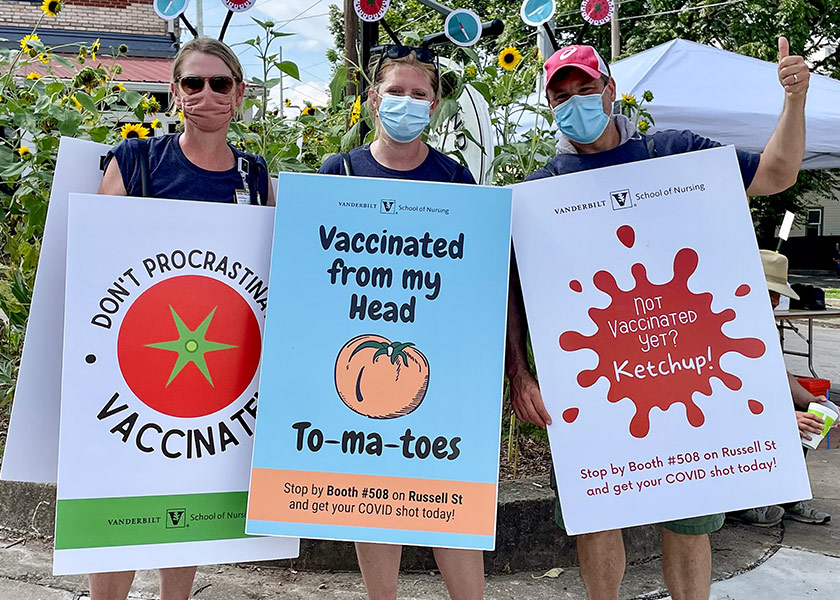Vanderbilt’s Mobile Vaccine Program visits Nashville’s underserved communities with lifesaving COVID-19 shots
Story by Jennifer Plant Johnston
The knocking at the front door startled Melissa Williams* as she tried unsuccessfully to nap between jobs. Ever since the highly contagious Delta variant of COVID-19 had taken Nashville into its grip, sleep had not come easily to the young single mother, who was worried about her children’s health as well as her own. So, when she opened the door to find representatives of Vanderbilt’s Mobile Vaccine Program on her porch, a feeling of relief washed over her.
“Before I lay down, I prayed that God would find a way for me to get the vaccine,” the exhausted woman told them, tears in her eyes. That day, she became one of more than 6,000 residents in the Nashville area who thus far have received a COVID-19 vaccine from the mobile team. Organized by Vanderbilt School of Nursing faculty and Vanderbilt University Medical Center, the program has been visiting underserved communities since March to educate residents about the importance of the vaccine and administer shots.
“To have the opportunity to be the person who is thinking about her needs, and the needs of people like her, is the most rewarding thing I’ve ever done in my career,” says one of the program’s co-founders Christian Ketel, DNP’14.
A meeting last winter between School of Nursing and VUMC leadership to lay the groundwork for the mobile program was among Ketel’s first priorities after getting vaccinated himself. Senior leaders were fully supportive from inception, he says.
“A very big part leading up to the launch of the Mobile Vaccine Program is the work that the School of Nursing has been doing in the community for decades, and that has helped lead to the success of the program,” says Ketel, who is an assistant professor of nursing and director of Vanderbilt Primary Care–West End, which provides health care to underserved populations.
Fellow Assistant Professor of Nursing Carrie E. Plummer, PhD, MSN’05, teamed with Ketel to launch and run the program, combining her logistical strengths with his salesmanship. Plummer teaches the School of Nursing’s year-long Community and Population Health course, which connects her with a lot of community groups.
“We came at it from different angles in the beginning,” Ketel says. “I was more focused on people experiencing homelessness and medically underserved communities, where she was focused on the medically vulnerable geriatric Nashvillians. We were a good match.”
Plummer’s desire to reach more underserved community members during the pandemic and to create service opportunities for her students led her to Ketel. The two “share the same heart,” she says, and a similar drive—they’ll go almost anywhere needed. When a someone who had health issues that kept her homebound reached out on social media for a home visit, Ketel went to her house and vaccinated six members of the household. When a worker said he couldn’t afford to take time off work to get vaccinated, Ketel went to his worksite and climbed up on the man’s forklift to give him a shot.
The team has encountered patients with numerous barriers to vaccination, including work conflicts, gaps in Internet literacy and English language proficiency, lack of regular medical care, and mistrust based on historical mistreatment, particularly among the African American, Kurdish and Hispanic communities.
“Ninety percent of what we do is conversations about vaccines and vaccine hesitancy,” Ketel says. “Ten percent is vaccinations. It feels, at times, like hand-to-hand combat between accurate and true information and volumes of disinformation.”
Community effort
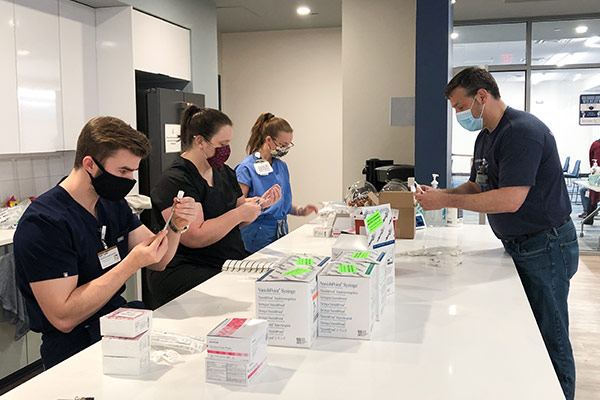 The Mobile Vaccine Program grew quickly from a successful spring pilot in Nashville’s Mercury Courts community, where School of Nursing and VUMC have long run a clinic for homeless and low-income patients. The vaccine program has attracted participation from Vanderbilt faculty, staff and student volunteers as well as pharmacy students and faculty at nearby Lipscomb University and undergraduate interns from Vanderbilt, Middle Tennessee State University and Tennessee State University. Outside agencies, including the Metropolitan Development and Housing Agency and Urban Housing Solutions, soon joined the program partners in the vaccine effort.
The Mobile Vaccine Program grew quickly from a successful spring pilot in Nashville’s Mercury Courts community, where School of Nursing and VUMC have long run a clinic for homeless and low-income patients. The vaccine program has attracted participation from Vanderbilt faculty, staff and student volunteers as well as pharmacy students and faculty at nearby Lipscomb University and undergraduate interns from Vanderbilt, Middle Tennessee State University and Tennessee State University. Outside agencies, including the Metropolitan Development and Housing Agency and Urban Housing Solutions, soon joined the program partners in the vaccine effort.
“We’ve had a partnership with the Vanderbilt School of Nursing that dates back years,” says Brent Elrod, managing director of Urban Housing Solutions. “More recently, because of COVID, Christian and Carrie have worked very hard to bring the vaccine to our properties, where we have a large number of folks with underlying health conditions and least access to health care.”
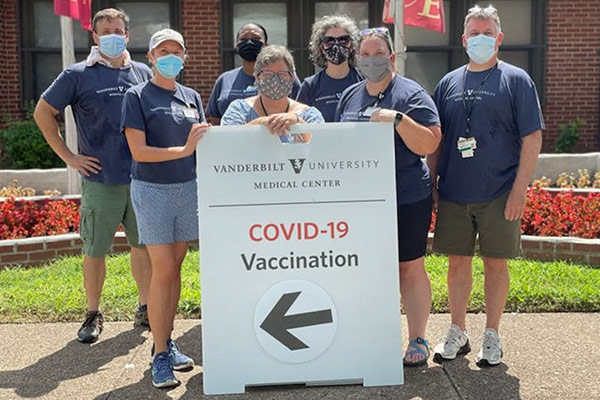 The mobile vaccine outreach efforts have resulted in high vaccination rates at several Urban Housing properties, including more than 90 percent of its residents at River Terrace in Inglewood.
The mobile vaccine outreach efforts have resulted in high vaccination rates at several Urban Housing properties, including more than 90 percent of its residents at River Terrace in Inglewood.
When Plummer connected with Paige Hopkins, MDHA’s COVID-19 resource navigator earlier this year, that agency already had cast a wide net with fliers and vaccine events. “At that point, everyone who wanted a COVID-19 vaccine had gotten one,” Hopkins says. “Door-to-door outreach became really important.”
In addition to going directly to underserved neighborhoods, mobile team members actively have sought out events around town where they can talk to attendees about the vaccine and administer shots. Even if only five people opt to get a shot at one of these events, the team returns to provide a second dose, Hopkins explains.
“It was important to have a person come and show that people really care, and they want to help,” she says. “I really felt like the residents could feel that energy.”
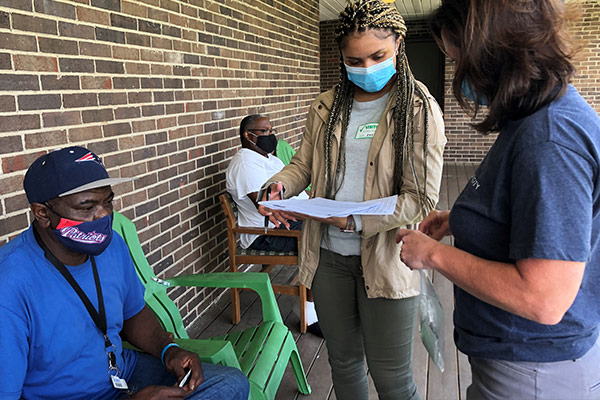
Brooke Smith, a recent graduate in health care administration at Tennessee State University, says knocking on doors opened her eyes to the mistrust and lack of health education among underserved communities.
“We were able to change a lot of minds and allow them to be more open to it,” says Smith, a 2021 summer intern with Mercury Courts. “I just feel like us going to them and reaching out to them showed that we care, we understand, and we’re here to help.”
The importance of empathy was the biggest takeaway for NCAA summer intern Maddie Souza of Danville, California. A medicine, health and society major at Vanderbilt, she is a senior on the Commodores lacrosse team.
“I saw how much they (the nurse practitioners) were willing to meet people halfway in communication and dialogue about health,” Souza says. “I learned a lot about the humanity part of it.”
Meanwhile, Sarah Uroza, Pharm.D, an assistant professor in the pharmacy practice department at Lipscomb School of Pharmacy, and faculty colleagues have brought pharmacy students to help draw up the vaccines, administer them and assist with vaccine storage and refrigeration, allowing Vanderbilt volunteers to focus on patient education.
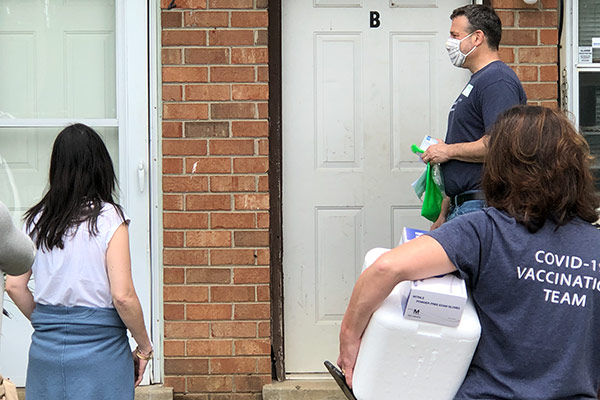 The Mobile Vaccine Program “has made such a difference, especially to homebound patients and those with lots of kids that just can’t get out of the house to get a vaccine,” says Uroza, a clinical pharmacist. “When you knock on their door and say you have one right now, and you don’t have to leave your house to get it, it makes it really hard to have an excuse not to get the vaccine.”
The Mobile Vaccine Program “has made such a difference, especially to homebound patients and those with lots of kids that just can’t get out of the house to get a vaccine,” says Uroza, a clinical pharmacist. “When you knock on their door and say you have one right now, and you don’t have to leave your house to get it, it makes it really hard to have an excuse not to get the vaccine.”
On tough days, the team vaccinated only a handful of people, recalls Uroza. But on another day, a hundred members of a Hispanic church showed up for a vaccination event, along with their priest.
That success was due in no small part to the groundwork already laid by Claudia Barajas, manager of community engagement for the Vanderbilt-Ingram Cancer Center, who also volunteered to help. “You can’t be with the community only for cancer during a pandemic,” Barajas says.
She partners with the vaccine team by going into churches in the Hispanic community on Sundays to announce upcoming mobile vaccine events, and to provide patient education. She finds that “many people are not clear how the vaccine protects them,” and those with immigration issues fear being tracked.
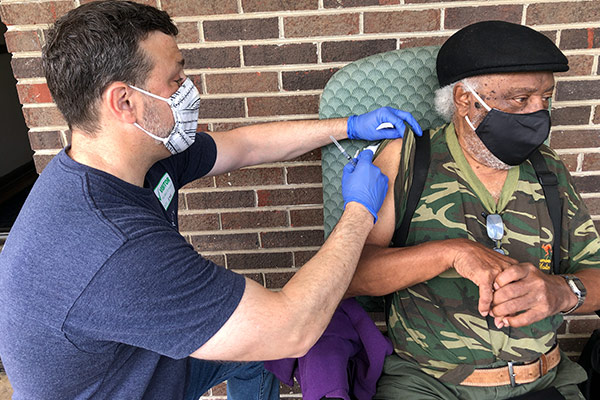 “Health disparity is a big issue in Tennessee, especially in the Hispanic and African American communities. There’s a lack of transportation, a lack of information, a lack of understanding of the importance of the vaccine, a lack of understanding of the language and the system,” Barajas says. “It takes years to change perceptions.”
“Health disparity is a big issue in Tennessee, especially in the Hispanic and African American communities. There’s a lack of transportation, a lack of information, a lack of understanding of the importance of the vaccine, a lack of understanding of the language and the system,” Barajas says. “It takes years to change perceptions.”
Partnerships, such as the one with Barajas, have allowed the mobile team’s mission to expand exponentially, Ketel says. Recently, they’ve moved into rural areas, where vaccine rates are alarmingly low.
“In some ways, although the pandemic has been a tragedy for the last two years, it’s really highlighted the importance of public health nursing,” Plummer explains.
“Humans aren’t the best at correctly assessing and understanding risk,” she says. “When it comes to health and wellness, as well as treating disease, nurses have an important role to play as advocates, educators and partners to patients at risk.”
*Not her real name
Images by Nancy Wise, Christian Ketel, Carrie Plummer
Photos, from top:
The vaccine program was invited to take part in East Nashville’s iconic street festival, Tomato Fest. Faculty and volunteers wore whimsical sandwich board signs to promote their location and encourage on the spot vaccinations. Left, Jennifer Kim, Kristen Maida and Christian Ketel.
Lipscomb University School of Pharmacy students and faculty fill vaccines while Christian Ketel waits to take them to the vaccinators.
The VUSN/VUMC Mobile Vaccine program volunteers are staffing events almost every weekend and several times during the week. They also are setting up return visits to give boosters and vaccinations for children.
TSU intern Brooke Smith (center) and VUSN Associate Dean for Community and Clinical Partnerships April Kapu review paperwork before vaccinating a Greentree Terrace resident during a door-to-door canvas. Greentree is one of several Urban Housing Solutions properties that were reached with vaccine efforts.
VUSN/VUMC Mobile Vaccine program volunteers knock on doors to ask if residents would like to be vaccinated.
Christian Ketel gives a Greentree Terrace resident his first COVID vaccine. The team returned several weeks later to give second shots, then later with boosters.
